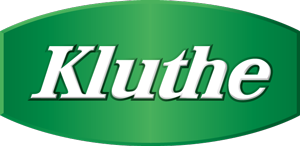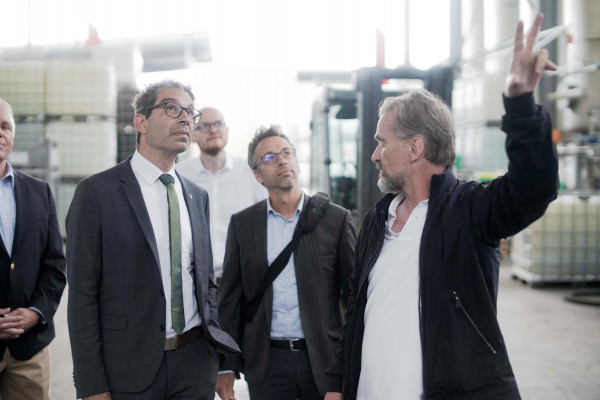Ministry for the Environment, Climate and Energy Management of the State of Baden-Württemberg visits companies in the region
State Secretary visits Chemische Werke Kluthe GmbH
Dr. Andre Baumann, State Secretary at the Ministry of the Environment, Climate and Energy Management, stopped by the Heidelberg-based family-owned company Kluthe on August 4 as part of his summer tour, "Raw materials - extract them domestically, use them efficiently and keep them in the loop," and exchanged ideas about their efforts in recycling, sustainability and environmentally friendly practices. Discussions focused on the company's role in environmentally conscious production, recycling, and the challenges facing the chemical industry in terms of sustainable development and regulatory requirements.
During a guided tour of the Wieblingen-Heidelberg plant, processes, products and recycling methods were explained in detail by both Kluthe and its recycling subsidiary Rematec. With this cross-section of both companies, synergies were made clear to manufacture products safely and in an environmentally friendly manner and to design them in such a way that they are placed on the market free of pollutants, resource- and energy-efficient as well as CO2-reduced.
Sustainability along the entire value chain is a central concern of the company. From the selection of sustainable raw materials, the development of water-based instead of fossil-based products, process improvements that save energy and resources at the customer's site, to the company's own freight forwarding company that brings back empties and used products from the customer to be reprocessed, the company strives for a holistic approach.
By taking back and reprocessing products that have already been used, Kluthe makes a significant contribution to the circular economy, which can be quantified by the enormous CO2 savings of around 25,000 tons at the Heidelberg site alone. These figures are calculated from the use of high-quality distillates as opposed to the original product. At the Mügeln plant in Saxony, an additional 40,000 tons of CO2 are saved per year. The company faces the challenge of providing sufficient storage and handling capacity and convincing customers of the high quality of the recyclates.
The fact that recycled products often achieve better performance and purity levels than fresh products has often been proven in practice. Intensive analytical monitoring of all batches ensures this high standard. For the user, the investment is recommended on account of the quality and environmental benefits, because the so-called product carbon footprint is shown and can be credited to the buyer's environmental balance sheet.
In the recycling segment, the industry encounters legal and, in many cases, bureaucratic hurdles, particularly with regard to the recognition of CO2 savings, the simplification of product take-back and the guarantee of a sustainable and affordable energy supply. These points were discussed intensively, as they are closely linked to the goals of sustainability and environmental friendliness that both politicians and Kluthe are pursuing. State Secretary Baumann agreed, saying that "circular economy must be worthwhile," thus highlighting the need for optimization of the Circular Economy Act.
During the visit, external factors affecting industry were also addressed, such as the high cost of Germany as an industrial location, bureaucratic hurdles, the labor shortage and the limited development of transport infrastructure. Dr. Baumann recognized the importance of these aspects for the sustainable development of industry and discussed their potential impact on the efforts of companies like Kluthe.
During his visit, State Secretary Baumann showed an attentive interest in the sustainability efforts and modern equipment of Chemische Werke Kluthe GmbH. He recognized the challenges facing companies in Germany in connection with energy and environmental regulations and underlined the potential for action in these areas. In this regard, he stressed that the time has come for companies in the region to step up their support for the accelerated development of green energy. At the same time, however, he also emphasized the need for politicians and authorities themselves to take bold decisions to pave the way for a sustainable energy future. The company's management is grateful for the opportunity for a continued, intensive exchange with politicians as well as the willingness of the Ministry of State to provide support in efficiently mastering bureaucratic channels.

